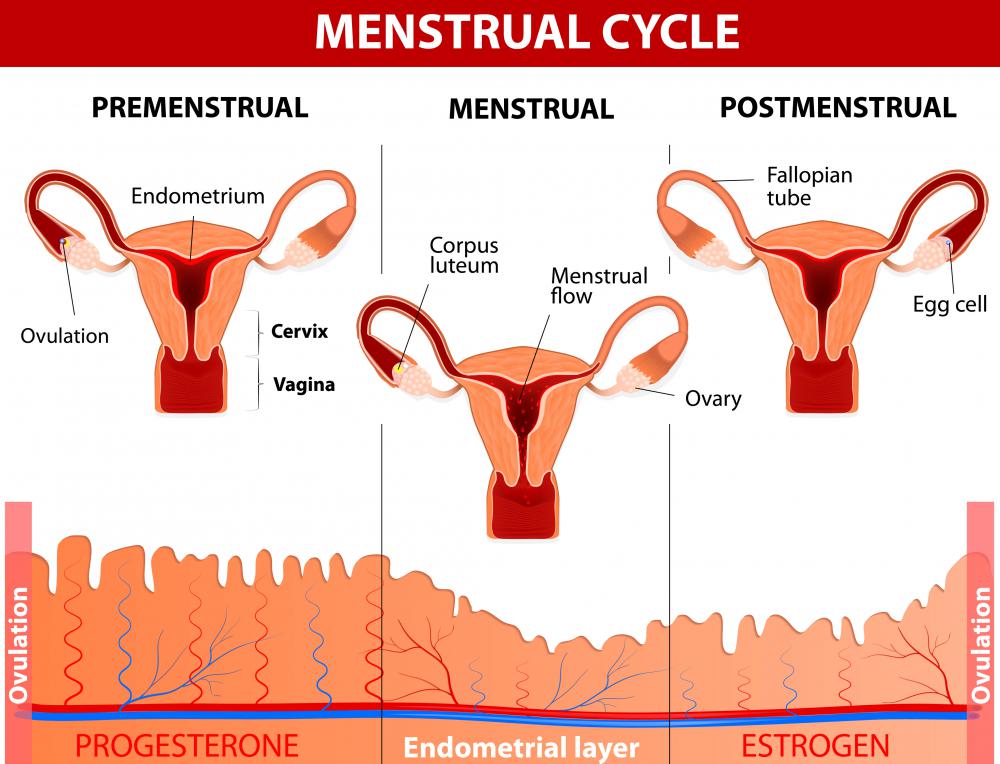At WiseGEEK, we're committed to delivering accurate, trustworthy information. Our expert-authored content is rigorously fact-checked and sourced from credible authorities. Discover how we uphold the highest standards in providing you with reliable knowledge.
What Happens to the Body Before Menstruation?
The typical woman's body can undergo significant hormone changes in the days and weeks before menstruation. These changes generally begin anew after each menstrual period ends. Hormonal changes generally start with a gradual increase in estrogen levels leading up to ovulation, which normally occurs on about day 14 of the average 28-day menstrual cycle. As the newly released egg travels down the fallopian tube towards the uterus, estrogen levels continue to increase, causing the lining of the uterus to thicken. If conception occurs, the fertilized egg will normally implant itself in the thickened uterine lining and begin to develop into a fetus, but if conception does not occur, the body's estrogen levels decrease and the uterus sheds its lining in what is commonly known as a menstrual period.
The average menstrual cycle is believed to last about 28 days, though it is considered normal for the cycle to vary from 21 to 35 days in length. Most healthy women enjoy regular menstrual cycles, in which menstruation begins on about the same day each month. The physical changes that generally occur in the days just before menstruation can serve to alert most women of the onset of a menstrual period.

Even healthy women who experience normal menstruation are considered likely to suffer some uncomfortable physical and emotional symptoms in the days just before menstruation. These symptoms are often collectively known as premenstrual syndrome (PMS). They can include bloating, fatigue, diarrhea or constipation, mood swings, and irritability. Though physicians do not fully understand what causes PMS, they believe it is connected to rising hormone levels in the body just before menstruation.

The normal menstrual cycle typically begins with a gradual increase in the hormone estrogen, which helps to stimulate ovulation, or the release of an egg from an ovary. Most women are believed to ovulate at the midpoint of their cycle, typically about two weeks after the last menstrual period. Women are generally considered most fertile on the three days prior to, and on the day of, ovulation.

Rising estrogen levels in the body also cause the uterine lining to become thicker. This thickened uterine lining typically develops into a fetal placenta, if conception occurs. If conception does not occur, estrogen levels decrease and menstruation begins. Symptoms of PMS typically abate in the first few days of the menstrual period, possibly due to lowered estrogen levels in the woman's body.
AS FEATURED ON:
AS FEATURED ON:















Discussion Comments
My menstrual cycle is like clockwork. I know exactly when I'm ovulating and when my period is about to start. I have slight pain on one side of my stomach when ovulation occurs. And right before my period, I become very emotional and get upset about everything. When I've started picking fights with every family member, I know that my period will start any day now.
@fBoyle-- Well, you have to understand that throughout human history infant death was very common. Most children did not make it past their first year because of disease or poverty. So women gave birth often and I think our reproductive cycle is suited for this. It's to ensure the continuity of human life.
Just imagine if women menstruated once every three moths or perhaps twice a year. What would be the chances of her conceiving? It would be very slim and reproduction would slow down so much that population rates would quickly decrease.
It's actually a good thing that our menstrual cycle lasts one month. We are given a fresh new chance every month to have a baby. Our reproductive organs know exactly what to do and when to make conception possible.
Every month, we go through the same things over and over again. I'm one of those people who always experiences PMS and sometimes rather severely. I feel like my body is taking revenge for not conceiving a child yet again.
I actually don't understand why our menstrual cycle is one month. Wouldn't it be better if we menstruated once every three months? I would make life so much easier.
Post your comments